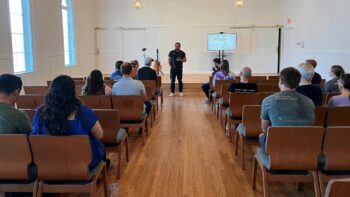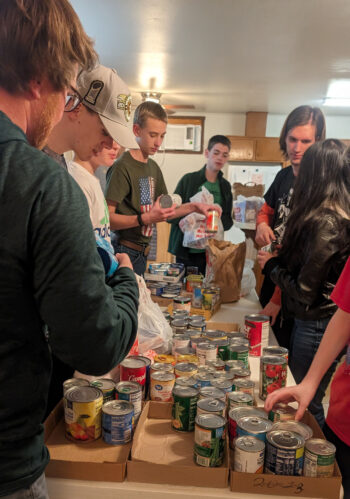FBC Round Rock focused on displaying the church they need to become
by Jessica King on June 16, 2025 in Stories of Impact

FBC Round Rock members packing Operation Christmas Child shoeboxes in Dec. 2024. FBC Round Rock serves as an Operation Christmas Child shoebox dropoff location.
Shortly after Dustin Slaton’s arrival to pastor First Baptist Church Round Rock in February 2021, former Texas Baptists Executive Director David Hardage stopped by and, aware that the church was in “pretty gradual decline,” he suggested Slaton connect with the then newly-hired director of Church Health and Growth, Jonathan Smith.
“He said, ‘Hey, we just hired this guy, Jonathan Smith, and he's going to be starting soon. I feel like you should touch base with him,’” said Slaton. “So, Jonathan and I connected, got together, and he came down [to Round Rock] and we talked… and he took us through some of the early processes of Pave, before it was ever Pave.”
Pave is Texas Baptists’ church revitalization strategy, designed to help pastors customize revitalization for their context by equipping them with resources and placing them in cohorts to be trained by a coach and encouraged within a community of pastors. Slaton said his church was “one of [Smith’s] guinea pigs” to figure out the Pave process and “how it would work with different churches.”
Being a church that reflects the community
Slaton’s Pave process kicked off with the “Know your Church” survey and the “Know your Community” report.
“Those two things were super beneficial; very helpful in helping our church grasp the reality of where we were at the time and see the genuine need for some change of direction [and] change of focus,” said Slaton.
One thing that stood out to Slaton from the “Know your Church” survey as needing a change was “the age disconnect within our church population."

FBC Round Rock hosts Young Adult Worship service in their remodeled chapel in Sept. 2024.
“When I came, our average age was 53, and the average age of our community was 35. So [we were] about 20 years off,” explained Slaton.
After conducting the surveys, Slaton made a chart comparing the average decline of the church over the past 20 years to the growth in the community and discovered that “even though our community was exploding by 100,000 people over that time period, our church actually managed to go down.”
In an effort to “become a church that reflects our community,” FBC Round Rock began getting young people to participate in Sunday worship services, “demonstrating and showing the church we wanted to become.”
“[One thing] that we utilize most consistently is the idea of showing the church you want to become,” said Slaton. “Everything from just having kids come up and [preaching] some children's sermons for [them] or having a teenager pray, or [having] teenager[s be a] part of the choir… just having more younger people, younger adults do active parts of the service was that was a big part of that.”
“I was talking with our young adult minister yesterday at lunch, and he said he feels like we've got to that critical mass point where the group of people is large enough, strong enough to where it's carrying its own momentum now. We're not having to really push that really hard in order to see growth, it's beginning to kind of grow on its own,” said Slaton.
Slaton said another way the church is displaying the church they need to become is by getting minorities involved in their congregation and worship as well.
“We're kind of a traditional downtown First Baptist Church. Our population or membership is very heavily Anglo, and it was even more so four years ago. So we tried to give stage presence to people who are nonwhite and also to women; to give them opportunities to pray or to [do] scripture reading,” explained Slaton.
Slaton said he is seeing “a very wide group of ethnicities” feel comfortable at his church.
“We have a really strong Indian population. In fact, if you take the two Indian dialects that we have within our church, it's the second highest spoken language within our church, even greater than Spanish… I think that’s the thing that is the coolest to me is that we're seeing our church become more and more diverse because our community is very diverse,” said Slaton.
According to Slaton, FBC Round Rock’s attendance is now averaging 20% non-Anglo, with 10% being international.
Over the past four years of implementing the “displaying the church you need to become” Pave principle as well as the “three-week baptism plan,” Slaton said the church has seen “consistent growth in attendance and the baptism numbers have tended to match that growth.” He said it has been exciting to see the growth in both young adults and diversity.
“I’ve been here for four years and it's just by the grace of God and the leadership of God, and his wisdom and willingness to work in the midst of what we just try to offer him that we've seen that growth,” said Slaton.
Building “strong community connection points”
FBC Round Rock has also seen “some increase in community involvement” since working through the revitalization process, which has created several “strong community connection points.”
The first of those is Manna Pantry, FBC Round Rock’s food bank, located on their campus across the street from local elementary and middle schools. Slaton said this location gets a lot of traffic, resulting in “people coming to our church and getting involved. We’ve got some kids in the kids' ministry that came through [visiting Manna Pantry].”

FBC Round Rock student ministry serving at the Manna Pantry in the summer of 2024.
Slaton said church members who serve at the Manna Pantry “really see that as a gospel ministry.”
“Everybody that comes in gets prayed for, and [volunteers] ask them if they would be willing to have a spiritual conversation with them, and so they get to share the gospel a lot. They've seen some people come to faith through that, and we've seen some people connect in that way as well,” said Slaton.
Also on FBC Round Rock’s campus is a remodeled chapel. Slaton said the chapel was used as the church’s “main worship space” through most of the 20th century, “up until the late 1970s” and hadn’t been updated since.
“We had this ongoing discussion for a few years of ‘Do we bulldoze it or do we redo it?’” said Slaton.
Due to the sentimental connection several church members had to the building, Slaton made the call to redo it. He said the remodel has “offered a space within our community where people can use it for other things” and serves as another community connection point.
Additionally, the church has connected with the community by serving with CarePortal, an online platform that connects kids and families in crisis with community support, to provide for a variety of needs.
“[CarePortal will] bring in a bunk bed and a dresser and a mattress and some clothes and diapers and whatever those people need to set up a house really quickly,” explained Slaton. “We just invite people to give donations… So [if we] have a mom [who] is walking into an apartment with nothing, we can set her up pretty well to be able to function.”
“[CarePortal] has given us some really neat opportunities to minister to people in some of their darkest moments,” said Slaton.
Committing to Pave, trusting the process
Slaton, now a Pave coach, encouraged pastors who are considering Pave to “do it but to commit to it.”
“Don't just do it half-heartedly, because if you do it half-heartedly, it's just not going to work for your church. It's work… [but] the coaches are there to help you through those steps and meet with you one-on-one if you need to,” said Slaton. “[So], commit to it and be a champion for it among your staff… and help them to see how the goal is not to change who your church is, but change the vision of what your church can become.”
Slaton also encouraged pastors to take their time and trust the process as they walk through Pave.
“I got to the church in February. I think I met Jonathan in March, by May and June, I was doing the “Know your Church” survey, by the end of the summer, we were developing a new vision, and by the time I celebrated my first anniversary, we were launching a new vision,” explained Slaton. “Pave has a much more structured timeline now, and I encourage pastors to go through the steps in a timeline that Pave has laid out, to really take time to evaluate who you are.”
Smith said Slaton is both a strong learner and a strong leader, qualities that have complemented each other well as Slaton has led his church through revitalization.
“Dr. Dustin Slaton is both a strong learner and a strong leader, two qualities that naturally complement each other. His outstanding leadership at FBC Round Rock has fostered a more evangelistic congregation and has been a catalyst for reaching young adults and young families,” said Smith, who now serves as the associate director of the Center for Church Health at Texas Baptists in addition to serving as director of Church Health and Growth.
Slaton recently joined Smith on the Pave Podcast to share his church’s revitalization story. He said one of the unique things about Pave is that “it's not taking all these churches and trying to make them into one model,” but instead helping each church figure out what sets them apart from others and “how they're uniquely called to connect and reach our community.”
“[Smith] does a fantastic job. He's already worked with so many Pave churches [and] he's got unlimited stories of how God is working in very unique ways,” said Slaton. “So getting to hear Jonathan's stories, both whenever I recorded with him, but also listening to the other episodes and listening to the other pastors that he's brought on there, [has] been a really fun experience. I enjoyed getting to be a part of that, and hopefully I get to do it again.”
Listeners can stream “Display the Church You Need to Become (with Pastor Dustin Slaton)” on all major podcast platforms.
Visit txb.org/pave to learn more about Pave and how it can be a resource to your congregation.
Strengthening a multiplying movement of churches to live out the Great Commandment and Great Commission in Texas and beyond.
The ministry of Texas Baptists is made possible by giving through the Texas Baptists Cooperative Program, Mary Hill Davis Offering® for Texas Missions, Texas Baptists Worldwide and Texas Baptist Missions Foundation. Thank you for your faithful and generous support.
Subscribe to receive stories like this one directly to your inbox.
We are more together.
Read more articles in: Stories of Impact, Pave, Church Health
More from Jessica King
- Corpus Christi church plant hosts annual retreat, meets medical needs for Ghanaian children with disabilities
- 98 BSM and church collegiate leaders form 2026 State Lead Team, develop skills to “change the culture” of ministry
- Behind The Chutes Cowboy Church shares resources, plants seeds of the gospel at Amarillo Fair & Rodeo
- Al Curley, III joins Texas Baptists Evangelism team as African American Evangelism Specialist
- Texas Baptists Indemnity Program open for applications, gives churches ability to focus on GC2 calling